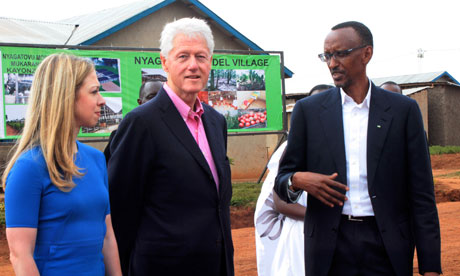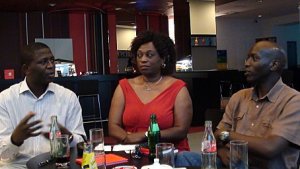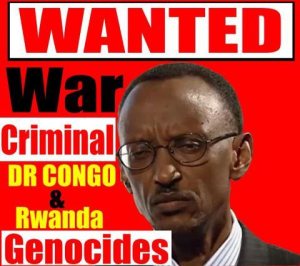L’oral
passé devant le Comité des sanctions des Nations unies par la
délégation rwandaise n’a convaincu personne. Face à des preuves
indémontables, la ruse de Kigali n’a pas trouvé preneur. Les parrains
viennent de prendre la mesure des égarements du régime Kagame. Face à
ces évidences, les USA et la Grande-Bretagne sont soumis à une épreuve
de choix entre un soutien aveugle aux conséquences humanitaires
dramatiques et des sanctions plus coercitives contre Kigali.
Echec et mât ! La ligne défensive
adoptée par Kigali au Conseil de sécurité des Nations unies n’a pas
convaincu. La détermination de la délégation congolaise, conduite à New
York par Raymond Tshibanda, ministre des Affaires étrangères et
Coopération internationale, porte d’autant plus que les membres du
Conseil n’ont pu disculper Kigali sur son soutien au M23.
Les envoyés de Paul Kagame ont eu du mal
à démonter les preuves accablantes apportées par Kinshasa, leur
laissant une seule issue : la compréhension des membres du Conseil de
sécurité afin d’échapper aux sanctions et à des poursuites. Un exercice
qui n’est pas gagné d’avance.
Kinshasa engrange des points
Le vent a tourné en faveur de Kinshasa.
Kigali se trouve du mauvais côté du tableau, la roue de l’histoire ayant
changé de cap. Les déboires diplomatiques qu’enregistre le régime de
Paul Kagame démontrent que la communauté internationale n’est plus
disposée à prendre comme de l’argent comptant les ruses de Kigali sur
tout ce qui se produit depuis les années 1990 dans la partie Est de la
RDC.
Devant le Conseil de sécurité, les
ministres rwandais et congolais des Affaires étrangères ont passé
séparément un oral en rapport avec la situation d’instabilité qui règne
dans l’Est de la RDC. Une étape préalable avant la publication de la
version finale du rapport de l’ONU qui a dénoncé le soutien du Rwanda
aux rebelles du M23.
Premier à rendre la parole, Louise
Mishikiwabo s’est évertuée à démontrer que son pays n’est pas impliqué
directement ou indirectement dans la guerre qui sévit en RDC. Dans sa
plaidoirie, la ministre rwandaise des Affaires étrangères a estimé que
les preuves contre son pays relèvent d’«une imagination créatrice» des
autorités congolaises. Les experts onusiens sont également passés à la
trappe.
Pour la délégation rwandaise, ces
experts onusiens ont rendu un rapport soumis à la manipulation de la
partie congolaise : «Quant au groupe d’experts de l’ONU, ces jeunes
hommes et femmes qui ont rédigé le rapport, comme Steven Hege, qui prône
la négociation avec les FDLR, il a aussi été manipulé par le
gouvernement congolais». La sentence de Kigali contre les experts
onusiens ne s’arrête pas en si bon chemin : «Comment les Nations unies
peuvent-elles désigner comme experts des gens aussi jeunes, aussi peu
expérimentés, qui se perdent même dans les acronymes. Même leur
intégrité est sujette à caution… Ils n’ont pas le niveau de
compréhension minimum nécessaire dans cette région», déclare James
Kabarebe dans le blog de Colette Braeckman, journaliste belge au
quotidien Le soir, spécialiste des Grands Lacs.
L’embarras
Le caractère subjectif avéré de cette ligne de défense rwandaise a visiblement agacé les parrains de Kigali.
Déjà, des sanctions symboliques avaient été prises contre Kigali. Les Etats-Unis, partenaire privilégié du Rwanda, ont gelé une assistance militaire de 200 000 Usd. D’autres bailleurs de fonds ont suivi la même voie, notamment la Suède, les Pays-Bas, la Grande-Bretagne et l’Allemagne. Ces Etats qui disposent de «grandes ambassades» dans la sous-région, ne peuvent pas se mouvoir sans avoir obtenu des informations objectivement vérifiées leur permettant de prendre des sanctions appropriées.
Déjà, des sanctions symboliques avaient été prises contre Kigali. Les Etats-Unis, partenaire privilégié du Rwanda, ont gelé une assistance militaire de 200 000 Usd. D’autres bailleurs de fonds ont suivi la même voie, notamment la Suède, les Pays-Bas, la Grande-Bretagne et l’Allemagne. Ces Etats qui disposent de «grandes ambassades» dans la sous-région, ne peuvent pas se mouvoir sans avoir obtenu des informations objectivement vérifiées leur permettant de prendre des sanctions appropriées.
Par le passé, il aurait suffi que le
Rwanda embouche la trompette du génocide pour que les éternels parrains
se montrent insensibles aux justifications venant d’ailleurs. Il se
faisait même que la partie congolaise soit privée de tribune après tout
passage des émissaires de Kigali.
Dépourvu de moyens de défense devant un
auditoire presque acquis à la cause de Kigali, il était apparu que la
cause congolaise ne pouvait trouver un écho favorable. Plus de dix
années passées, les parrains du Rwanda sont revenus à la raison. Le
génocide, fonds de commerce maintes fois présenté, ne fait plus recette
au sein de la communauté internationale. Les parrains de Kigali ont
maintenant compris que cette ruse servait les intérêts d’une bande
d’affairistes déterminées à se servir des richesses congolaises au
détriment de la paix et de la cohabitation pacifique entre les deux
peuples.

Vivant grâce à la perfusion permanente
de la communauté internationale, le Rwanda ne pourrait pas soutenir
encore plus longtemps une guerre sur le territoire congolais. Cette
manière de couper les vivres à un filleul belliciste est de nature à
tempérer ses ardeurs ainsi que sa propension à tout régler par la
violence.
Dans une interview récente, le président Kagame n’avait-il pas déclaré avoir reçu mission de «faire partir Joseph Kabila par tous les moyens» ? Les Etats-Unis et la France étaient nommément cités.
Dans une interview récente, le président Kagame n’avait-il pas déclaré avoir reçu mission de «faire partir Joseph Kabila par tous les moyens» ? Les Etats-Unis et la France étaient nommément cités.
A ce jour, l’un des plus proches
collaborateurs du président rwandais, le ministre de la Défense James
Kabarebe s’est déclaré, se confiant à Colette Braeckman, que «la
frustration de l’Occident qui voulait arrêter Bosco Ntaganda et poussait
le président Kabila à le faire» est la cause du désamour avec
l’Occident.
A en croire cette même personnalité
rwandaise, qui passe pour le n°2 du régime de Kigali, les parrains
voulaient que cette arrestation se fasse avec le concours du Rwanda. Ce
camouflet justifie-t-il un changement aussi radical du traitement
réservé à Kigali ? Difficile de le prendre sans l’avoir préalablement
passé à une analyse rigoureuse.
En réalité, les faits sont tellement flagrants, voire évidents, que devant leurs opinions publiques respectives, les parrains de Kigali ne pouvaient valablement pas présenter des justifications plausibles.
En réalité, les faits sont tellement flagrants, voire évidents, que devant leurs opinions publiques respectives, les parrains de Kigali ne pouvaient valablement pas présenter des justifications plausibles.
Dos au mur, les parrains de Kigali ont
devant eux un choix cornélien à opérer : soit poursuivre le soutien et
sombrer dans les travers d’une prédation contraire aux pratiques
généralement admises entre Etats civilisés, pour ne pas être soumis au
même traitement que ces dirigeants en cas de procès. Soit lâcher tout
soutien à Kigali.
Les neuf millions de morts enregistrés à ce jour dans l’Est de la RDC appellent réparation, d’une part. D’autre part, cette communauté internationale, si prompte à donner des leçons sur les valeurs morales, fera porter le chapeau, tôt ou tard à des exécutants de cette sale besogne.
Les neuf millions de morts enregistrés à ce jour dans l’Est de la RDC appellent réparation, d’une part. D’autre part, cette communauté internationale, si prompte à donner des leçons sur les valeurs morales, fera porter le chapeau, tôt ou tard à des exécutants de cette sale besogne.
Chantres de l’impunité, les maîtres du
monde ne pourront pas effacer allègrement les traces de la disparition
de plusieurs millions de personne sans émouvoir leurs populations
respectives. Kigali n’a pas compris que ce jeu malsain ne pouvait pas
durer indéfiniment. Par devoir de moralité, les parrains de Kigali ne
sont plus disposés à porter cette responsabilité en public. L’exécutant –
le Rwanda - qui a pris goût à la prédation sans prendre des
précautions d’usage, voit ainsi sa responsabilité pénale être agitée
comme un épouvantail.
Le coin de voile levé au Comité des
sanctions des Nations unies démontre à suffisance que l’épée de Damoclès
est suspendue sur la tête des dirigeants rwandais impliqués dans le
drame de l‘Est de la RDC.
Le mystère qui reste à élucider serait celui de savoir si les exécutants de la sous-région seront seuls au box des accusés lorsqu’il s’agira de rendre compte par rapport à tout ce qui se passe dans l’Est de la RDC. Agaçant !
Le mystère qui reste à élucider serait celui de savoir si les exécutants de la sous-région seront seuls au box des accusés lorsqu’il s’agira de rendre compte par rapport à tout ce qui se passe dans l’Est de la RDC. Agaçant !


 La
ligne de défense de Kigali n’a convaincu personne au Conseil de
sécurité. La réplique de 130 pages présentée par la ministre rwandaise
Mishikiwabo n’a pas pu distraire la lucidité des membres du Conseil qui
ont réservé une fin de non recevoir à cette argumentation cousue d’un
tissu de contre-vérités. Les violations documentées par les experts
onusiens sont donc indémontables. Les sanctions diplomatiques et les
poursuites pénales sont attendues dans les tout prochains jours.
La
ligne de défense de Kigali n’a convaincu personne au Conseil de
sécurité. La réplique de 130 pages présentée par la ministre rwandaise
Mishikiwabo n’a pas pu distraire la lucidité des membres du Conseil qui
ont réservé une fin de non recevoir à cette argumentation cousue d’un
tissu de contre-vérités. Les violations documentées par les experts
onusiens sont donc indémontables. Les sanctions diplomatiques et les
poursuites pénales sont attendues dans les tout prochains jours.












